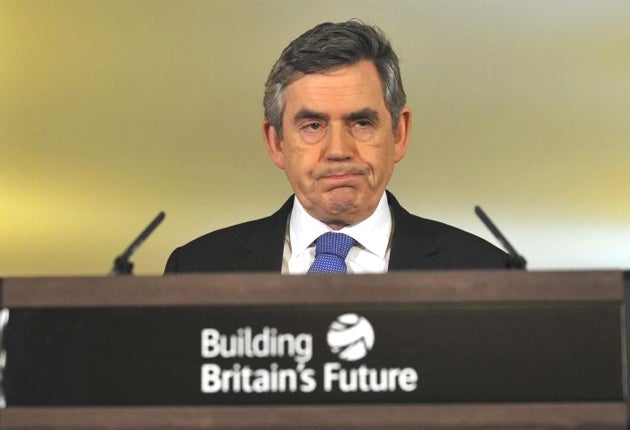What a horrible year I've had, says Brown
PM in reflective mood at final press conference before recess

Your support helps us to tell the story
From reproductive rights to climate change to Big Tech, The Independent is on the ground when the story is developing. Whether it's investigating the financials of Elon Musk's pro-Trump PAC or producing our latest documentary, 'The A Word', which shines a light on the American women fighting for reproductive rights, we know how important it is to parse out the facts from the messaging.
At such a critical moment in US history, we need reporters on the ground. Your donation allows us to keep sending journalists to speak to both sides of the story.
The Independent is trusted by Americans across the entire political spectrum. And unlike many other quality news outlets, we choose not to lock Americans out of our reporting and analysis with paywalls. We believe quality journalism should be available to everyone, paid for by those who can afford it.
Your support makes all the difference.Gordon Brown admitted yesterday that he had endured a "difficult year" – but insisted he could still defy the odds to lead Labour to victory at the general election.
As the outspoken, outgoing Foreign Office minister Lord Malloch-Brown described Mr Brown's election prospects as "incredibly bleak", the Prime Minister conceded that what he called his "tough decisions" had dented Labour's popularity in the short term. But he insisted that voters would recognise their long-term merits when they had to make a choice between Labour and the Conservatives rather than give a mid-term referendum verdict on the Government.
Asked at his final Downing Street press conference before his summer break whether he had had an "annus horribilis", Mr Brown replied: "It has been a difficult year because we have had to make tough decisions and tough choices." But he added that it had not been the "most difficult" he had experienced.
He admitted he had been "tested by events" such as the financial crisis and the MPs' expenses scandal, arguing that no British government had ever had to cope with two such huge problems at the same time. "We will stick by our course and we will be judged by the results of our policies," he said.
Mr Brown said that more "tough choices" lay ahead on public spending but stopped short of endorsing the Business Secretary Lord Mandelson's warning last week that Britain faced 10 years of austerity on spending.
Dismissing opinion polls suggesting that four out of five voters believe substantial spending cuts would be needed, the Prime Minister said: "It depends how you ask these questions. If you were asking people do you want your numbers of nurses and numbers of doctors and the improvements in your hospitals to be safeguarded, they would say yes. I think the answer from the British public when you look at specific services on which people depend, is that they would prefer to see these services protected."
Mr Brown insisted that the "dividing line" in politics was between a Labour Party which had intervened to safeguard at least 500,000 jobs during the recession and a Conservative Party that would let the recession "run its course" and allow unemployment to rise.
"We have got to spend through this recession so that we can invest for the future," he said, adding that future spending would depend on growth and employment, and that Labour was the party that could be trusted with public services.
Mr Brown said he would take only "a few days' holiday", suggesting that his family break in the Lake District would be a short one. He is expected to spend most of August at his Scottish home before returning to Downing Street towards the end of the month. He said he intended to relax with his two sons and "watch a lot of sport" during his own holiday.
Defending the Commons' 82-day summer recess, he said MPs would spend "most of the time" working. "An MP's job is to be both a constituency representative and to be someone who votes and discusses these matters in the House of Commons. If an MP's job was only to be in the Commons then you would have a case. But an MP's job is also to be in the constituency, and listening to people."
On the economy, Mr Brown said: "The Government's action will shorten the recession and it will reduce its impact... There is no room for complacency. The world economy remains fragile, economic recovery cannot be taken for granted either here or abroad."
Goodbye to all that...
Gordon's lows
* Labour's defeat in Glasgow East by-election a year ago
* Aide Damian McBride quits
* Embarrassing YouTube video on MPs' expenses in April
* Commons defeat on Gurkhas
* Resignation of James Purnell
Gordon's highs
* Rescuing banks last October
* Making up with Mandelson
* Labour win in Glenrothes by-election last November
* G20 London summit in April
* Surviving coup last month
Join our commenting forum
Join thought-provoking conversations, follow other Independent readers and see their replies
Comments